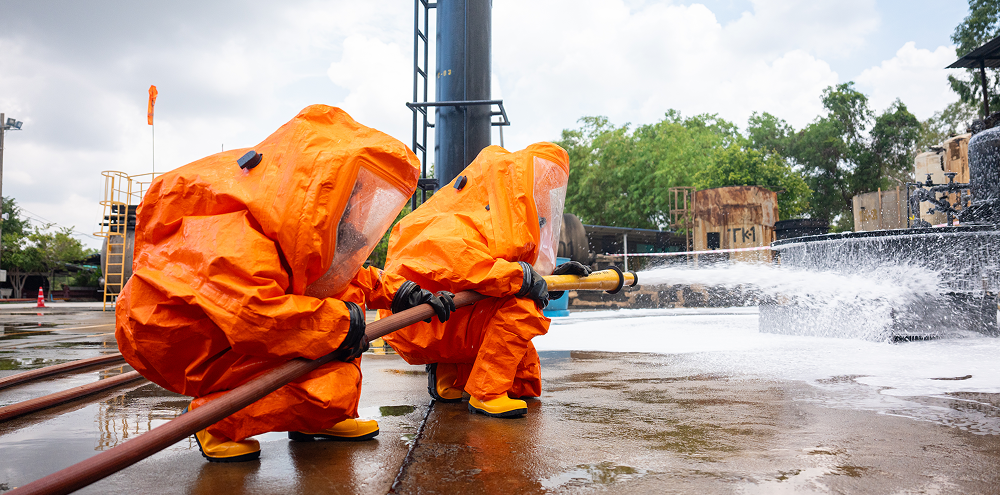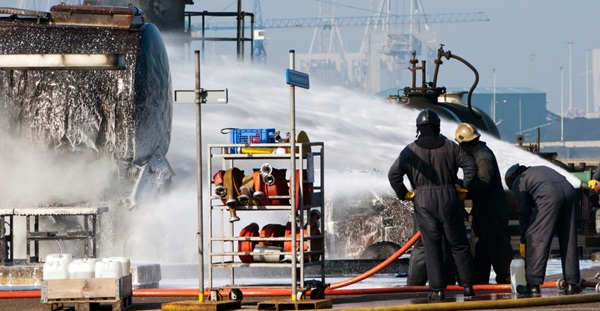Few issues have captured the attention of industries, governments and investors alike quite like the growing challenge of PFAS (per- and polyfluoroalkyl substances). These substances, often associated with industrial processes and consumer products, can persist in the environment if not effectively managed, potentially finding their way into our water, soil, air and materials found in our homes or workplaces. This raises the question: how can businesses navigate the regulatory, operational and reputational risks of PFAS while building resilience for the future?
The global regulatory landscape, though fragmented, continues to rapidly evolve. In the United States, the Environmental Protection Agency’s (EPA) designation of certain PFAS compounds as hazardous substances under the Comprehensive Environmental Response, Compensation, and Liability Act (CERCLA) has created new liabilities and compliance requirements, while the European Union is accelerating its efforts to eliminate PFAS under its Green Deal initiative. And while these are key drivers, the challenge extends beyond compliance. For organizations with global operations and complex supply chains, PFAS management is a key consideration in driving alignment between business strategy, risk mitigation and sustainability goals.
-
READ MORE
At the same time, studies like the one undertaken by First Insight and the Baker Retailing Center at the Wharton School found that 75% of Generation Z prefer to buy sustainably rather than prioritize brand names. Businesses that respond proactively to these shifting public expectations can position themselves as industry leaders, strengthening trust and reputation with stakeholders. This dual pressure - from regulators and the public - creates not just challenges but opportunities for transformation.
With over 1,000 PFAS projects completed globally and proprietary tools like Fluoro Fighter™, FluoroChaser and the PassiveX™ PFAS Sampler, Arcadis is uniquely positioned as a sustainable transformation partner for clients looking to take the lead with their PFAS management strategy.
This article explores a strategic framework for tackling PFAS and emerging contaminants, with forward-looking solutions that enable businesses to move from compliance to continuity.
The Case for Transformation
PFAS management has shifted from being a purely regulatory concern to a strategic priority for businesses. The complexity of global operations, combined with mounting public pressure, demands a multi-dimensional approach.

The Corporate Imperative
PFAS management is no longer just an environmental issue for businesses - it’s a strategic priority. The risks and exposure are multifaceted - from regulatory fines and cleanup costs to supply chain disruptions and reputational damage. Increasingly, investors are prioritizing sustainable business practices and responsible operations, with PFAS compliance being recognized as a key indicator of corporate responsibility.
Mandates like the European Union's Corporate Sustainability Reporting Directive (CSRD) require large firms, both listed and unlisted, to disclose detailed information on environmental impacts, including the management of hazardous substances like PFAS. The U.S. Environmental Protection Agency also introduced PFAS reporting requirements under the Toxic Substances Control Act (TSCA), though enforcement approaches have varied over time, aligned with evolving regulatory priorities. Directives like these aim to enhance transparency and corporate accountability, in turn influencing investor assessments. These shifts present both challenges and opportunities. Companies that fail to demonstrate progress proactively risk falling behind and turning this compliance requirement into a competitive differentiator.
As an example, Arcadis recently partnered with a global automotive manufacturer to assess PFAS risks associated with their supply chain and products across multiple global production facilities. The findings informed an enterprise-wide sustainability strategy, helping them address investor concerns while also mitigating potential long-term liabilities.

Rising Public Interest and Expectations
Public awareness around PFAS has been surging since 2019, driven by media coverage, legal actions and advocacy campaigns. Consumers are increasingly demanding greater transparency and accountability from businesses and governments. This shift, with many actively seeking PFAS-free product alternatives, is creating pressure for industries to innovate, particularly in consumer-facing sectors such as apparel, food packaging and electronics.
Over the years, Arcadis has been supporting brands with their transition to safer, more sustainable alternatives. For instance, Arcadis’ FluoroChaser™ SearchBot has been instrumental in helping companies rapidly analyze safety data sheets (SDS) to identify PFAS in supply chains. This tool was key in assisting an outdoor apparel company eliminate PFAS from its manufacturing process, enhancing its sustainability profile and capturing the trust of environmentally conscious consumers.
A Framework for Action: Four Pillars of Futureproof PFAS Management
1. Proactive Risk Identification and Vulnerability Assessments

Proactive risk identification is foundational to effective PFAS management. Companies operating across diverse geographies must evaluate vulnerabilities within their portfolio and operations to avoid or minimize costly liabilities. Vulnerability assessment tools can analyze site-specific hydrogeology, municipal water data and regulatory hotspots, to help businesses prioritize resources effectively, driving cost and operational efficiencies.
Arcadis has conducted comprehensive PFAS risk evaluations for clients across various industries using its proprietary PFAS Vulnerability Tool. This tool helps organizations identify potential liability hotspots and prioritize high-risk areas for action. By analyzing factors such as site-specific hydrogeology, regulatory requirements and operational conditions, clients are empowered to develop targeted strategies that can reduce compliance delays, optimize resource allocation and minimize remediation costs.
2. Forensics, Ambient and Background Investigations
Forensic analysis offers critical insights such as fingerprinting PFAS sources and providing data to establish ambient background conditions (i.e., the levels of PFAS in the environment that are the result of atmospheric processes – such as precipitation (rain) - and not necessarily associated with the activities of a site/facility). Businesses need tools to help them distinguish between legacy pollution and other ongoing local/regional industrial discharges to not only mitigate risks, but also to plan and allocate resources effectively. Ambient and background investigations are a key component of forensic efforts, helping establish credible and defensible strategies to our clients in cases of litigation and regulatory enforcement/disputes.

Arcadis has extensive experience with forensic investigations to address PFAS-related challenges. By utilizing advanced techniques such as chemical fingerprinting and ambient (background) investigations, we have helped organizations identify specific sources of PFAS and other substances of concern with scientific precision. As a result, clients can focus their efforts and investments strategically, optimize resource allocation and strengthen their position in discussions with regulators and stakeholders. These kinds of tools provide the critical insights needed to mitigate liabilities and safeguard reputations effectively.
3. Global Portfolio Management
Managing PFAS risks across multinational operations, particularly across a large portfolio of sites, can often be complex and resource intensive. It requires a unified strategy that can balance global oversight with local flexibility to legislation and other key considerations. Digital tools, such as Arcadis’ PFAS Regulatory Tracking Tool, allow organizations to monitor and stay agile to evolving requirements across regions, while prioritizing high-risk locations with effective investment of funds.

Arcadis' PFAS Regulatory Tracking Tool provides organizations with real-time insights into the rapidly evolving legislative landscape, enabling them to stay ahead of compliance challenges. This tool empowers businesses to identify high-risk sites across multiple locations based on an international regulatory database to effectively prioritize compliance efforts. By combining the PFAS Regulatory Tracking Tool with Arcadis' broader expertise in portfolio-wide PFAS management, businesses have been able to substantially reduce compliance-related project delays, improve resource efficiency and minimize potential liabilities.
4. Scalable Solutions with Advanced Technologies
Scalable solutions go beyond ‘just technology’. They are about creating tailored frameworks together with innovative solutions that integrate seamlessly with our clients’ needs.

Scalable solutions are at the heart of tackling PFAS challenges effectively, particularly for multi-national corporations managing diverse asset portfolios. Arcadis’ proprietary innovations, such as Fractionation Technology and Fluoro Fighter™, provide cost-effective remediation options while addressing long-term sustainability goals.
Our Fractionation Technology, for instance, has the proven ability to reduce PFAS concentrations in water by up to 99%, offering an efficient and environmentally responsible solution to minimize the costs associated with managing PFAS as a waste. Similarly, Fluoro Fighter™ supports organizations in transitioning away from PFAS-containing firefighting foams, helping clients meet evolving regulatory requirements while maintaining operational readiness.
Arcadis partnered with an airline operator in Australia to utilize Fluorofighter to clean sewer and stormwater infrastructure, reducing residuals present in effluent discharging to surface water. Then, our Fractionation Technology was also applied to reduce and minimize the volume of PFAS impacted liquid waste that was subject to elevated offsite disposal costs.
PFAS levels were reduced to a concentrated volume of less than 1% of the original impacted volume, ensuring compliance with strict local environmental standards, while also minimizing the cost of offsite destruction of this waste.
As part of our commitment to deliver innovative PFAS management solutions, our team is leveraging a strategic partnership with Ovivo, a leader in water and wastewater treatment equipment, to manufacture and implement full-scale PFAS treatment systems in North America. These systems utilize ozone fractionation technology, patented by Evocra, which has been proven to effectively reduce PFAS concentrations in complex water streams. Through this collaboration, we continue providing clients with scalable, cutting-edge solutions tailored to the needs of federal, state, and municipal agencies as well as private industrial clients.
The New Paradigm of Product Stewardship
Product stewardship is fast becoming a cornerstone for more sustainable corporate practices, particularly with tightening PFAS regulations and increased consumer expectations. Most companies today see transitioning to safer PFAS-free alternatives as an opportunity to go beyond compliance to gain market differentiation and strengthen consumer trust.

The future of product stewardship lies in leveraging technology that can help anticipate and mitigate risks before they escalate. Tools like Arcadis’ FluoroChaser™ SearchBot can proactively identify PFAS in supply chains, evaluate risks and develop tailored mitigation strategies.
From Challenge to Opportunity
The escalating concern over PFAS clearly presents a pivotal moment for industries worldwide. Beyond regulatory compliance, this challenge offers a unique opportunity for businesses to lead in environmental stewardship and innovation, building a strong market reputation. The global PFAS waste management market alone, valued at approximately $1.8 billion in 2022, is projected to reach around $2.9 billion by 2031. This growth signals the increasing demand for effective and innovative PFAS solutions.
Companies that proactively invest in advanced and proactive PFAS management strategies today can differentiate themselves as leaders, future-proofing their operations. Those that don’t, risk falling behind. Embracing innovative technologies and comprehensive risk assessments will be key to transforming these environmental challenges into a competitive advantage.
Now is the time for decisive action. Don’t wait for the next wave of regulations – partner with experts who can help you adopt forward-thinking approaches, ensuring your resilience and leadership in a rapidly evolving landscape.

Get trusted advice on PFAS management
Our specialists can help you navigate regulatory complexities, mitigate risks and implement sustainable remediation strategies that are tailored to your operational needs. Get in touch with us today, and we will connect you with our team.











